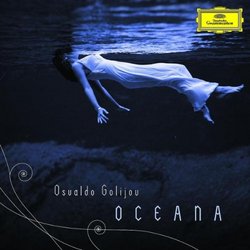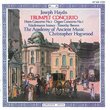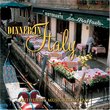| All Artists: Osvaldo Golijov, Robert Spano, Atlanta Symphony Orchestra and Chorus, Jay Anderson, John Dearman, Scott Tennant, Elizabeth Remy Johnson, Jamey Haddad, Dawn Upshaw, Luciana Souza Title: Osvaldo Golijov: Oceana Members Wishing: 4 Total Copies: 0 Label: Deutsche Grammophon Original Release Date: 1/1/2007 Re-Release Date: 7/10/2007 Genres: Pop, Classical Styles: Vocal Pop, Opera & Classical Vocal, Chamber Music, Historical Periods, Classical (c.1770-1830) Number of Discs: 1 SwapaCD Credits: 1 UPC: 028947764267 |
Search - Osvaldo Golijov, Robert Spano, Atlanta Symphony Orchestra and Chorus :: Osvaldo Golijov: Oceana
 | Osvaldo Golijov, Robert Spano, Atlanta Symphony Orchestra and Chorus Osvaldo Golijov: Oceana Genres: Pop, Classical
Oceana is the key work of this album, a composition for orchestra, three guitars, harp and voice, filled with Latin and jazz sounds. It is performed by the acclaimed Los Angeles Guitar Quartet, the Atlanta Symphony Orche... more » |
Larger Image |
CD DetailsSynopsis
Album Description Oceana is the key work of this album, a composition for orchestra, three guitars, harp and voice, filled with Latin and jazz sounds. It is performed by the acclaimed Los Angeles Guitar Quartet, the Atlanta Symphony Orchestra under conductor Robert Spano (also on Ainadamar), and the multiple Grammy® nominated Brazilian jazz singer Luciana Souza. This piece was Golijov's first commission of a choral work in the spirit of J.S. Bach and became a source of inspiration for La Pasión según San Marcos (St. Mark Passion), a future release on DG. Tenebrae is a collaboration with the famous Kronos Quartet--one of the most influential ensembles of our time. The meditative work in two movements "is about pain," says Golijov, "but pain seen from inside and from a distance." Despite being Golijov's reflection on today's tormented world, Tenebrae is a work of radiant beauty that offers consolation and a prayer for peace. Similarly Requested CDs
|
CD ReviewsOsvaldo Golijov: The Alchemist Grady Harp | Los Angeles, CA United States | 01/06/2008 (5 out of 5 stars) "Argentine born Osvaldo Golijov is one of today's more important composers, a gifted artist who is unafraid to combine elements of jazz, ritual, Latin American rhythms, and Jewish elements in his disparate works. At times critics of his work point a finger to his excesses, but that has been done before (Mahler, Strauss, Rachmaninov, etc) and the composers find the golden mean that makes their music durable. This recording combines three quite different works. The title piece is bristling with percussion and guitars and some very sensuous singing by Luciana Souza as well as choral work (the Gwinnett Young Singers) and the Atlanta Symphony Orchestra and Chorus conducted by Robert Spano. It is theatrical, exhilarating, and endlessly exciting. The second work 'Tenebrae' is a work that deals with inner sadness and is played with consummate skill by the Kronos Quartet. Despite the elegiac aspect of the music it is never less than beautiful and actually uplifting, full of hope. The final set 'Three Songs' is quite simply a masterpiece. Set to three poems by Sally Potter, Rosalia de Castro and Emily Dickinson, the work is for soprano and full orchestra and while the texts deal with tragedy and death, the emotional response to this elegant writing is transcendentally beautiful. Dawn Upshaw owns this cycle and this recording one of her most beautiful - in a collection of splendid recordings! For this listener this work is the most successful and most moving on the CD. Golijov is young and already a master. One wonders what he will embrace next! Grady Harp, January 08" In a word: beautiful Samer T Ismail | Danbury, CT | 08/18/2007 (5 out of 5 stars) " What amazes me when I listen to this disc--as I've probably done half a dozen times this week--is how much trouble I've had finding the words to describe it accurately. Part of the "problem"--and it is clearly mine, not the music's--is that the music is simultaneously utterly different from anything I've listened to, and yet reminiscent of so many composers--just to name a few, I was reminded of John Adams' "Harmonium" and Heitor Villa-Lobos' "Bachianas Brasileiras" in "Oceana", Bach and Verdi in "Tenebrae," and Bernstein and Gershwin in "Three Songs." And, of course, it is not possible to discuss this CD without talking about Golijov's two muses--Luciana Souza in "Oceana," and Dawn Upshaw in "Three Songs." I don't think I can even imagine anyone else performing either of these works nearly as well as these two women do. And, like so many of their other recordings, the Atlanta Symphony Orchestra (and Chorus, for "Oceana") perform admirably. In fact, I can think of only one "negative" about this CD at all, and that is the remarkably high pickup on the recording. At just half-volume on my speakers, the climaxes of "Oceana" were almost overpowering; I can only imagine what it would be like at full volume in a live performance. If you're already a fan of Golijov, you should need no further persuasion from me to buy this CD. If you're not, this CD is likely to make you a convert--as it did with me." Meditative Moods, Profound Passions Dr. Debra Jan Bibel | Oakland, CA USA | 08/15/2007 (5 out of 5 stars) "These three pieces of Golijov are important works. The compilation is united by a solemnity and cognition of transience, of memories, of life; the ever changing sea conveying fleeting travelers, the pain and loss of the diaspora and holocaust of Jew and Roma, the arrival and loss of our dreams and our pains, the condition of our small planet in a vast cosmos. The middle piece, wonderfully performed by the Kronos Quartet, for me it the gem of the CD, so tightly composed, each note to the mystical point. Upshaw brings an ethereal quality to the songs, providing tension and its sweet release. Oceana, the first work, has its passionate Latin textures by word and instrument, which brings new discoveries with each listening. While I would prefer an anthology with greater diversity of mood, this CD is rich in sonic treasure."
|

 Track Listings (12) - Disc #1
Track Listings (12) - Disc #1








